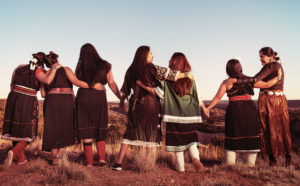Osage Tribe
Restructuring the narrative.
April 14, 20185 Indigenous Women Asserting the Modern Matriarchy
They’re reclaiming the tradition of female leadership and turning the old, white, male-dominated perspective of history on its head.
It is precisely because this historical narrative is biased that righting this wrong isn’t as simple as cherry-picking the names of notable Native women and inserting them into textbooks or other media. In order to truly improve public understanding of important indigenous women in history, the entire narrative has to be restructured. And who better to do that than Native women themselves?
Today, contemporary indigenous women are taking the matter into their own hands and showing the public how to rethink, reframe, and relearn a new American-Canadian story that seamlessly incorporates the voices of indigenous women. These women are living in the tradition of their ancestors, whose societies and nations were often matriarchal. They are reclaiming the tradition of female leadership and turning the old, white, male-dominated perspective of history on its head.
The following are five Native American and First Nations women who are using their platforms in such profound ways that they are also, in a sense, making history.
Follow link:
http://www.yesmagazine.org/peace-justice/5-indigenous-women-asserting-the-modern-matriarchy-20180330
_______
Mountain West News Bureau
Nate Hegyi
“The data breach prompted a “Delete Facebook” movement that hasn’t really gained any traction.
That’s especially true in the Native American community, where Facebook is much more than sharing cat videos or keeping in touch with friends and family.
Social media is vital in Indian Country. It helps connect communities and reservations that are scattered across North America. Many are in rural, isolated places that don’t get a lot of attention from national media outlets.
Places like Pablo, a small, one-highway town in northwest Montana where Patrick Yawakie goes to college. He was an organizer for Native Lives Matter a couple years ago.
And in Indian Country that message can also be about mundane things — from community classes to bike donations and fundraisers. And then there are public service announcements that can actually save lives.
When a bad blizzard caused a state of emergency on the Blackfeet Reservation in Montana, people used Facebook to warn which roads were closed and to get food to needy families.
But as much as she loves Facebook, Lamb said indigenous communities would find other ways to get in touch and organize if it disappeared. She pointed to the founding of the American Indian Movement in the late 1960s.
“They didn’t have Facebook and I think they got a lot of things done,” she said. “So they would obviously adapt and change to the world and find a way. There’s always a way.”
Full article:
______
NPR
“A true account of the early 20th-century murders of dozens of wealthy Osage and law-enforcement officials, citing the contributions and missteps of a fledgling FBI that eventually uncovered one of the most chilling conspiracies in American history.”
“In his new book, Killers of the Flower Moon, David Grann describes how white people in the area conspired to kill Osage members in order steal their oil wealth, which could only be passed on through inheritance. “This was a culture of complicity,” he says, “and it was allowed to go on for so long because so many people were part of the plot. You had lawmen, you had prosecutors, you had the reporters who wouldn’t cover it. You had oilmen who wouldn’t speak out. You had morticians who would cover up the murders when they buried the body. You had doctors who helped give poison to people.”
Steve Inskeep and author David Gann:


